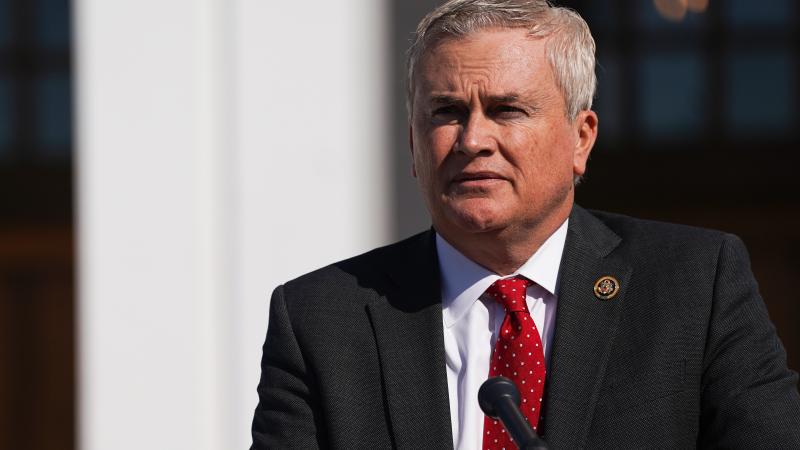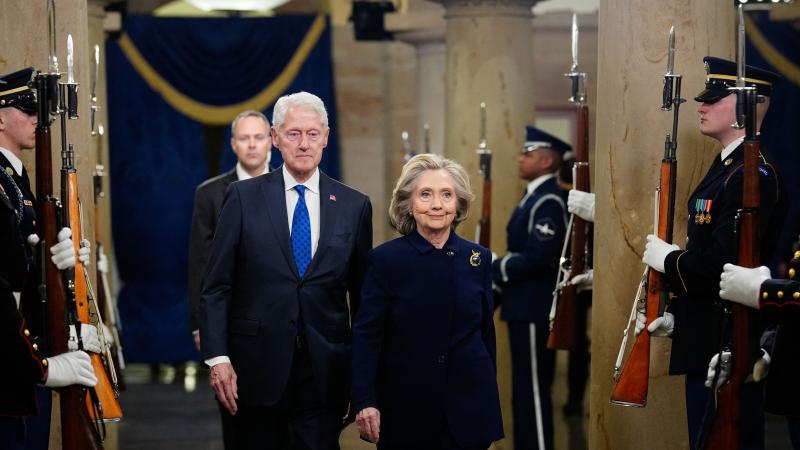Biden ramp up of Title 42 expulsions for 'political optics,' not securing border: ex-border chiefs
Administration deal with Mexico to expel Cubans, Nicaraguans "is targeting people fleeing communist and socialist regimes" for partisan political reasons, charged GOP congressional candidate Anna Paulina Luna.
The Biden administration's new push to expel Cubans and Nicaraguans at the southern border under a soon-to-expire pandemic-related measure to deny migrants asylum is a political ploy that will have no impact on combating illegal immigration, according to former senior border enforcement officials.
"This is purely political optics," said Rodney Scott, who served as chief of U.S. Border Patrol in both the Trump and Biden administrations. "With approximately 7,000 illegal entries every day, and the Biden administration's public statements that Title 42 is being terminated within weeks, the numbers of Cubans and Nicaraguans that are being considered here are irrelevant."
Others, meanwhile, suspect a partisan Democratic administration is trying to limit the expansion of a politically inconvenient subset of the Spanish-speaking immigrant population.
"The administration is targeting people fleeing communist and socialist regimes in Cuba and Nicaragua," charged Anna Paulina Luna, a Hispanic-American of Mexican descent who's running for Congress in Florida's 13th District. "Biden and his team know if Hispanics are here speaking the language and can tell others that Democrats are pushing similar policies to the ones in the countries they fled, that'll be a big problem for them."
U.S. officials confirmed Wednesday that the administration struck a deal with the Mexican government to expel up to 100 Cubans and 20 Nicaraguans a day to Mexico from border facilities in San Diego, El Paso, Texas, and Rio Grande Valley, Texas.
The Associated Press was first to report on the agreement.
"The administration is clearly down in the polls and against the beliefs in this country due to what they're not doing to secure the border and stop the flow of illegal immigration," said Mark Morgan, former acting commissioner of U.S. Customs and Border Protection. "They want to be able to point to something productive and say, 'We're working with Mexico and getting things done.'"
Polling has shown for months that the majority of Americans disapprove of President Biden's handling of immigration, in large part due to the surge in the number of people who've crossed the southern border illegally since Biden entered office.
The figure reached nearly 2.4 million illegal border crossings from March of last year to this past March, the last month for which there's publicly available data and the month with the highest number of migrant encounters during the Biden administration at 221,303. Preliminary figures obtained by the Washington Post say there were about 234,000 encounters in April, but they haven't been made official.
By comparison, there were just over 626,000 such crossings from January 2020 to January 2021, former President Trump's last year in office.
There's been an especially sharp increase in illegal border crossings by Cubans and Nicaraguans. Specifically, U.S. authorities in March stopped Cuban migrants more than 32,000 times at the southern border, double the amount from February. Nicaraguans, meanwhile, were stopped in March more than 16,000 times, over double the amount from September.
This surge seems to be the main reason for the new U.S.-Mexico deal, according to Mark Krikorian, executive director of the Center for Immigration Studies. Mexican officials said the same to the AP.
However, the policy will have little effect on stemming the flow of illegal immigration, according to the experts who spoke to Just the News.
Krikorian described the arrangement with Mexico as a way for Biden's team to demonstrate action against illegal immigration without doing enough to anger the progressive wing of the Democratic Party.
Before the deal, Mexico only agreed to take Guatemalans, Hondurans, El Salvadorans and Mexicans under Title 42, the public health authority exercised by the Trump administration that allows border officials to expel migrants without allowing them to apply for asylum in order to limit the spread of COVD-19.
"The administration is using Title 42 as a crutch to avoid taking real action on immigration," said Krikorian. The new deal with Mexico "has to be part of a broader deterrence strategy. But this administration has a strategy not to deter illegal immigration."
"It's all smoke and mirrors," said Morgan, noting that expelling hundreds means little if tens of thousands are trying to cross the border. "What the administration is doing will do nothing to secure the border."
Even those who are sent back to Mexico "have nothing to lose" by just trying again, according to Krikorian.
"Mexico is its own country," he added. "We have to defend our own border."
Both Scott and Morgan echoed that sentiment.
"The Biden administration is further empowering the government of Mexico by allowing them to set polices for the U.S.," said Scott. "In the last administration, the U.S. set the polices and expectations and then held Mexico accountable."
Morgan noted that Mexico at one point had some 25,000 personnel strengthening its interior enforcement during the Trump administration but that the Mexican government has become more lax since then.
"Trump was dealing with this from a position of strength and leverage and didn't ask for action; he demanded it," said Morgan. "That drove Mexico and the Northern Triangle countries [Guatemala, Honduras, and El Salvador] to step up and get some skin in the game. Now, however, Biden is going with hat in hand and begging Mexico for assistance. We should coordinate with other countries, but we shouldn't be relying on them to secure our border."
Instead, Biden has been trying to woo Hispanics with his border policies — a courtship that is backfiring, according to Luna.
"The administration is having a hard time understanding why Hispanics in general aren't supporting them," she said. "This is largely due to our faith and value system."
Only 26% of Hispanic voters approve of Biden's job performance, according to recent polling.
Even with Title 42 in place, the Biden administration has taken steps to lessen its reach.
"Since the day that the Biden administration took office, they began creating carve outs to the enforcement of Title 42," said Scott. "First, they exempted the unaccompanied children. But that continually expanded to countless special interest groups which now make up about half of all encounters."
The timing of the ramp-up of expulsions using Title 42 has raised eyebrows since it comes as the Biden administration pushes to end the measure — a move that's been criticized by both Democrats and Republicans. Recent polling has shown that most Americans want to keep the health policy in place.
Krikorian predicted "mayhem" when the measure is lifted, saying the administration has "telegraphed to people" that at that point "they can all go to the border and make asylum claims."
Secretary of Homeland Security Alejandro Mayorkas warned this week that as many as 18,000 migrants could cross the border daily if the health policy ends.
The new deal went into effect April 27 and will end May 22, the day before Title 42 is set to expire. However, a federal judge in Louisiana last month temporarily blocked the Biden administration from ending Title 42, and the next hearing in the case is scheduled for May 13.
Regardless of when Title 42 actually ends, the arrangement expelling Cubans and Nicaraguans will be short-lived.
The White House didn't respond to a request for comment for this story on what motivated the border expulsion push in light of its short shelf life and the administration's stated desire to end Title 42.
The Department of Homeland Security was likewise asked what motivated the agreement. A spokesperson responded by simply citing department procedure.
"The CDC's Title 42 public health order remains in place with respect to single adults and family units, and the Department of Homeland Security continues to operate in accordance with that order," the spokesperson said. "Our ability to expel individuals under that authority may be limited for several reasons, including Mexico's capacity to receive those individuals. Individuals who are not able to be expelled under the CDC’s Title 42 public health order are processed through the department's Title 8 immigration authorities."
















